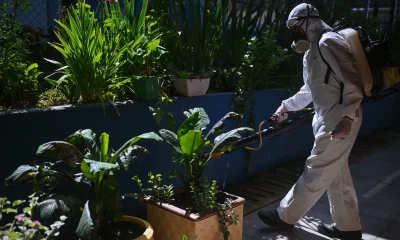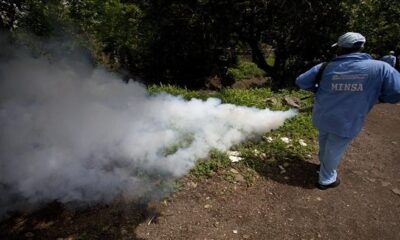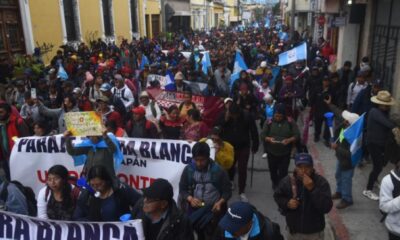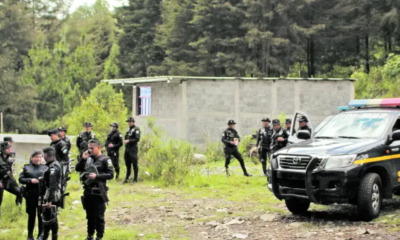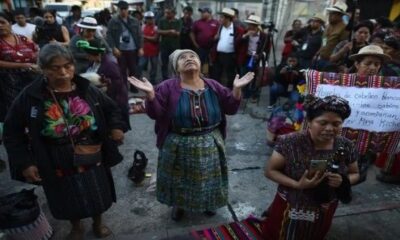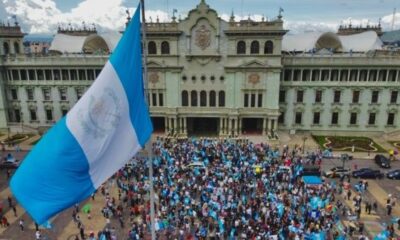Central America
Threats from the migratory route in Guatemala: dengue, arrests and climate change
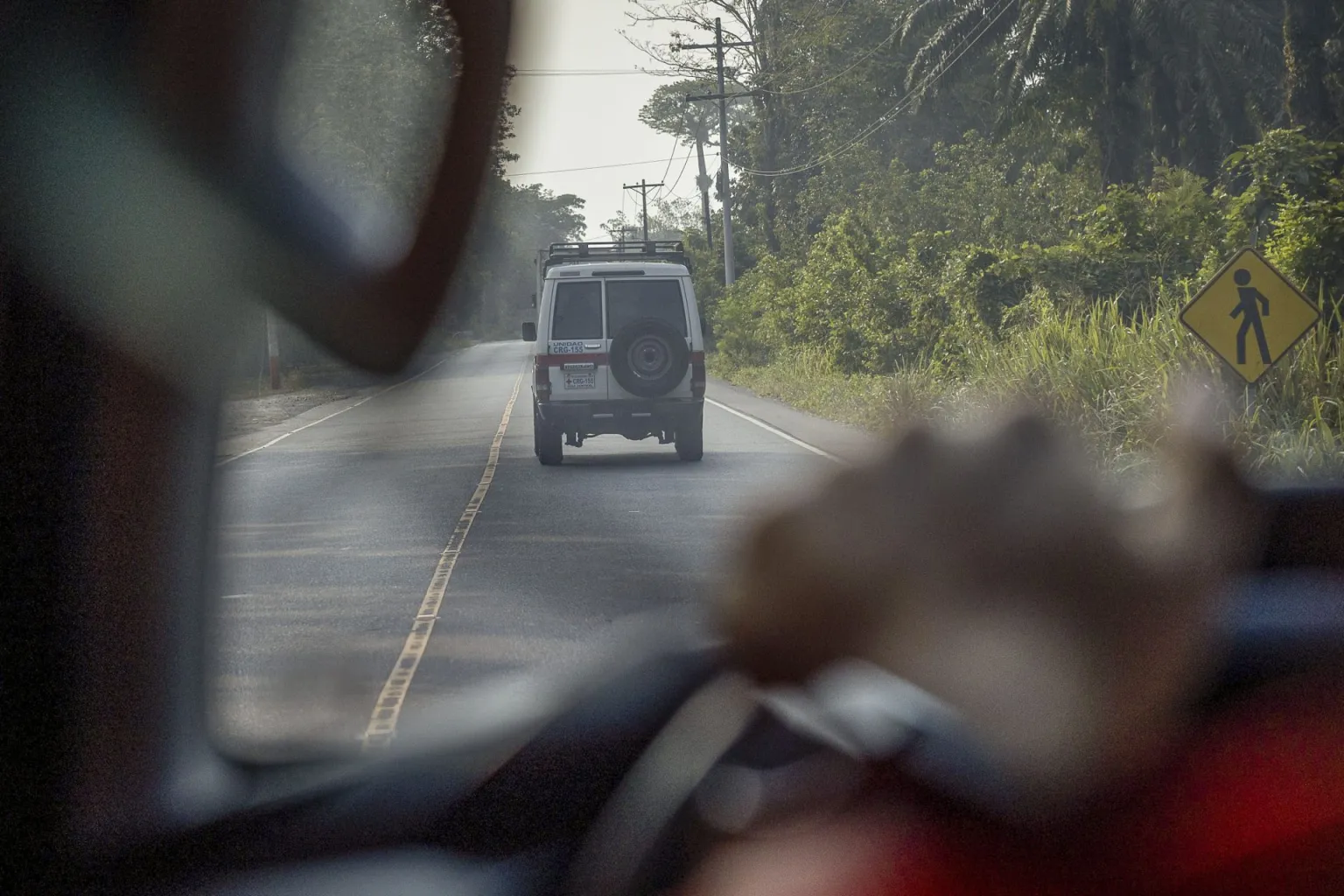
Thousands of migrants cross the border between Honduras and Guatemala daily on their way to the United States, facing the threat of tropical diseases such as dengue, the arrest of security forces and their subsequent deportation or the impact of a route hit by climate change.
On the border of El Corinto, between Guatemala and Honduras, the country’s Red Cross serves migrants who need medical assistance.
“Our job is to alleviate the suffering a little and dignify the lives of people who are in transit,” explains to EFE Mariana Bonilla, who works with the Red Cross at the Care Center for Migrants and Refugees (CAPMIR), located on the Guatemalan side of the border.
Every morning, Bonilla, 31, and the rest of her team, track the border road surrounded by African palm, banana plantations and the imposing Motagua River, the largest in Guatemala, in search of groups of migrants to guide them and indicate the points where they can receive support.
Within its center of attention, supported by the International Federation of Red Cross and Red Crescent Societies (IFRC), migrants receive both medical and psychosocial assistance. “Many come with traumas from their passage through the Darién jungle” between Colombia and Panama, explains Bonilla.
Two kilometers after crossing the border, on the migratory route, is the village of Jimeritos, a community made up of farmers dedicated mainly to the cultivation of bananas that for six years has turned its small communal room into a refuge for migrants to rest.
“We are motivated to work with migrants. They leave their countries to seek an improvement for their family and here we give them what we can, because we do not know when we will have the same need,” explains Felicita Palencia, a resident of Jimeritos who was trained by the Red Cross to take care of migrants.
The community lounge has a bedroom with capacity for 12 people and, according to the leaders of the village, there are nights where they receive up to 30 migrants who seek refuge before continuing their journey to the Mexican border of Tecún Umán, located about 540 kilometers at the other end of the country.
Community community members pay attention despite the difficulties they are going through, such as strong dengue epidemics that affect the department of Izabal, where in 2023 more than 500 cases were registered and the region was put on red alert by the health authorities, a disease from which migrants are not freed either.
On May 2, in the community room, the Red Cross gathered the children of the Jimeritos public primary school to give them a talk about hygiene and sanitation measures to eliminate the mosquito that transmits dengue, as well as tools to identify the symptoms of this disease.
Carlos Linares, who has lived in this migrant host village for 42 years, assures EFE that the biggest concern for them is climate change, since the rainy season is approaching and in years such as 2001 and 2020 many houses were destroyed by storms.
“This part of the road is the most difficult to get to the United States, because there are a lot of police and they can return us to Honduras,” Mario Alvarado, a Honduran migrant who decided to look for the “American dream,” explains to EFE.
With temperatures of 40 degrees, Alvarado crossed the border, bordering the Motagua River and the African palm plantations, to end up arrested by the Guatemalan authorities.
Alvarado is the third time he has been on his way to the United States. He does it with his compatriot Danny Gámez, the same one with whom a few months ago they were deported from Texas, United States, after a journey that allowed them to work in the North American nation as painters.
Like Alvarado and Gámez, thousands of migrants seek to cross Guatemala every year and so far in 2024 alone, almost 8,000 have been arrested by the security forces for their subsequent deportation, according to figures from the Guatemalan Migration Institute (IGM).
“It doesn’t matter how many times we are deported. If there are no conditions to live in Honduras, we will always find a way to leave again,” Alvarado reiterates, before moving away between the path of a plantation with his journey companion.
Central America
U.S. and Guatemala Sign Trade Deal Granting Zero Tariffs to Most Exports

The United States signed a reciprocal trade agreement with Guatemala on Friday, under which 70.4% of Guatemalan exports will enter the U.S. market tariff-free.
Guatemalan President Bernardo Arévalo highlighted the importance of the agreement, stating that it creates a framework of cooperation, certainty, and new opportunities for producers, workers, and entrepreneurs in the country. His remarks were shared in a video published on his official social media channels.
In 2025, 30.3% of Guatemala’s total exports were destined for the United States, amounting to approximately $4.3 billion. As a result, the agreement is expected to directly benefit key sectors of the Guatemalan economy, including agribusiness, manufacturing, and the textile industry.
“Today we have taken another step toward consolidating a country that, when it moves forward united, generates confidence, attracts investment, and creates real development opportunities for all its people,” Arévalo added.
The agreement with Guatemala follows a similar trade deal signed by the United States with El Salvador on Thursday, which includes the elimination of a 10% tariff on Salvadoran imports.
Central America
Panama Supreme Court Strikes Down Panama Ports Concession as Unconstitutional

Panama’s Supreme Court of Justice has ruled unconstitutional the concession contract granted in 1997 to Panama Ports Company (PPC), a subsidiary of the Chinese conglomerate CK Hutchison, which operates two strategic ports along the interoceanic canal. The decision was announced on Thursday, January 29, 2026, following two lawsuits filed by the Comptroller General’s Office.
The ruling directly affects the management of the ports of Balboa, on the Pacific coast, and Cristóbal, on the Atlantic side, both of which have been operated by the company for nearly three decades. According to Panama’s Comptroller General, Anel Flores, an audit uncovered irregularities in the contract that resulted in more than $1.3 billion failing to enter state coffers.
“It is a predatory contract, abusive to the interests of the country,” Flores stated.
The Supreme Court determined that Law 5 of 1997, its subsequent amendments, and the automatic extension granted in 2021 are unconstitutional. The ruling noted that the contract renewal took place without adequate oversight and amid allegations of corruption, despite the Panamanian state holding only a 10% stake in the company.
Central America
Guatemala President Says Starlink Terminal Found Inside Prison

Guatemalan President Bernardo Arévalo revealed on Tuesday that a Starlink terminal was discovered inside a prison in the country, highlighting corruption and the illegal introduction of advanced communication technology into the penitentiary system.
Arévalo did not specify which prison the device was found in but stressed that Starlink’s ability to connect directly to low-orbit satellites makes it particularly difficult to disrupt, posing a serious security risk.
The disclosure was made during a press conference attended by Interior Minister Marco Antonio Villeda and Defense Minister Henry Sáenz.
On January 6, specialized units of Guatemala’s National Civil Police (PNC), members of the Army and prison security personnel carried out Operation Sentinel at the Renovación 1 Maximum Security Prison for Men, located in Escuintla. According to the Interior Ministry, the operation aimed to reduce criminal activity, prevent illicit acts and stop the trafficking of prohibited items inside the prison.
During the operation, authorities also dismantled businesses operating near several prisons after detecting routers that were allegedly used to redirect internet signals into penitentiary facilities, according to local outlet Emisoras Unidas.
Tensions escalated further over the weekend of January 17 and 18, when inmates affiliated with gangs staged riots in three prisons. During the unrest, they took prison guards and a psychologist hostage, demanding extra-large beds, air conditioning, transfers to other facilities and access to the internet.
-

 Central America5 days ago
Central America5 days agoGuatemala Police Arrest Prison Guard Caught in the Act of Extortion
-

 Central America5 days ago
Central America5 days agoHonduras swears in conservative president Asfura after disputed election
-

 Central America5 days ago
Central America5 days agoBukele leads public trust rankings as UCA survey highlights gains in security
-

 International3 days ago
International3 days agoFootball Fan Killed in Clashes After Colombian League Match
-

 Central America3 days ago
Central America3 days agoGuatemala President Says Starlink Terminal Found Inside Prison
-

 International5 days ago
International5 days agoDoomsday clock moves to 85 seconds before midnight amid rising global risks
-

 International2 days ago
International2 days agoU.S. Senate Rejects Budget, Bringing Government Closer to Shutdown Amid DHS Dispute
-

 International5 days ago
International5 days agoWinter Storm Fern Leaves 30 Dead and Over One Million Without Power Across the U.S.
-

 Sin categoría5 days ago
Sin categoría5 days agoEight Killed in Series of Armed Attacks in Ecuador’s Manabí Province
-

 International5 days ago
International5 days agoSpain approves plan to regularize up to 500,000 migrants in Historic Shift
-

 International3 days ago
International3 days agoMissing Spanish Sailor Rescued After 11 Days Adrift in Mediterranean
-

 International3 days ago
International3 days agoRubio Says U.S. Could Participate in Follow-Up Russia-Ukraine Talks
-

 Sin categoría5 days ago
Sin categoría5 days agoEl Salvador Launches Fourth Year of Ocean Mission to Protect Marine Ecosystems
-

 Central America1 day ago
Central America1 day agoPanama Supreme Court Strikes Down Panama Ports Concession as Unconstitutional
-

 International2 days ago
International2 days agoStorm Kristin Kills Five in Portugal, Leaves Nearly 500,000 Without Power
-

 Central America1 day ago
Central America1 day agoU.S. and Guatemala Sign Trade Deal Granting Zero Tariffs to Most Exports
-

 International2 days ago
International2 days agoTrump Says Putin Agreed to One-Week Halt in Attacks on Ukraine Amid Extreme Cold
-

 International2 days ago
International2 days agoMan Arrested After Vehicle Crashes Into Jewish Institution in Brooklyn





























































